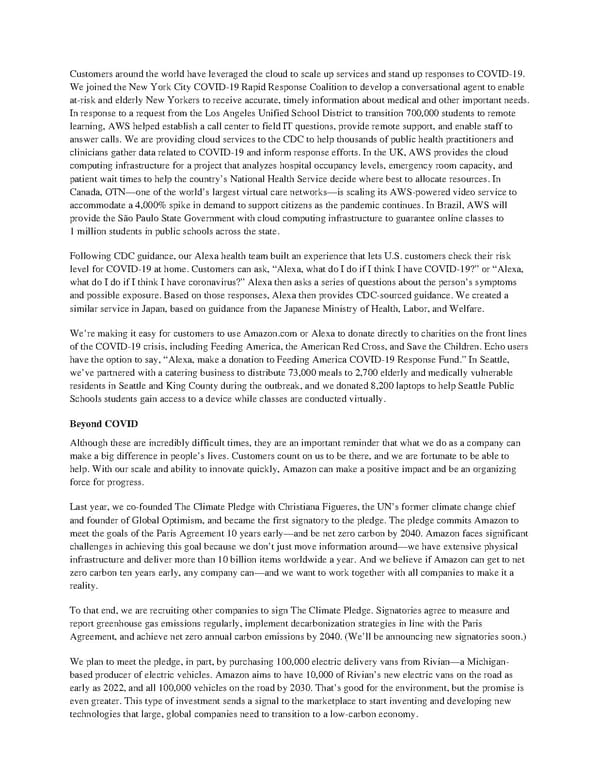Customers around the world have leveraged the cloud to scale up services and stand up responses to COVID-19. WejoinedtheNewYorkCityCOVID-19RapidResponseCoalitiontodevelopaconversational agent to enable at-risk and elderly New Yorkers to receive accurate, timely information about medical and other important needs. In response to a request from the Los Angeles Unified School District to transition 700,000 students to remote learning, AWS helped establish a call center to field IT questions, provide remote support, and enable staff to answer calls. We are providing cloud services to the CDC to help thousands of public health practitioners and clinicians gather data related to COVID-19 and inform response efforts. In the UK, AWS provides the cloud computing infrastructure for a project that analyzes hospital occupancy levels, emergency room capacity, and patient wait times to help the country’s National Health Service decide where best to allocate resources. In Canada, OTN—oneoftheworld’slargest virtual care networks—is scaling its AWS-powered video service to accommodate a 4,000% spike in demand to support citizens as the pandemic continues. In Brazil, AWS will provide the São Paulo State Government with cloud computing infrastructure to guarantee online classes to 1 million students in public schools across the state. Following CDCguidance, our Alexa health team built an experience that lets U.S. customers check their risk level for COVID-19 at home. Customers can ask, “Alexa, what do I do if I think I have COVID-19?” or “Alexa, what do I do if I think I have coronavirus?” Alexa then asks a series of questions about the person’s symptoms and possible exposure. Based on those responses, Alexa then provides CDC-sourced guidance. We created a similar service in Japan, based on guidance from the Japanese Ministry of Health, Labor, and Welfare. We’re making it easy for customers to use Amazon.com or Alexa to donate directly to charities on the front lines of the COVID-19 crisis, including Feeding America, the American Red Cross, and Save the Children. Echo users have the option to say, “Alexa, make a donation to Feeding America COVID-19 Response Fund.” In Seattle, we’ve partnered with a catering business to distribute 73,000 meals to 2,700 elderly and medically vulnerable residents in Seattle and King County during the outbreak, and we donated 8,200 laptops to help Seattle Public Schools students gain access to a device while classes are conducted virtually. BeyondCOVID Although these are incredibly difficult times, they are an important reminder that what we do as a company can makeabigdifference in people’s lives. Customers count on us to be there, and we are fortunate to be able to help. With our scale and ability to innovate quickly, Amazon can make a positive impact and be an organizing force for progress. Last year, we co-founded The Climate Pledge with Christiana Figueres, the UN’s former climate change chief and founder of Global Optimism, and became the first signatory to the pledge. The pledge commits Amazon to meet the goals of the Paris Agreement 10 years early—and be net zero carbon by 2040. Amazon faces significant challenges in achieving this goal because we don’t just move information around—we have extensive physical infrastructure and deliver more than 10 billion items worldwide a year. And we believe if Amazon can get to net zero carbon ten years early, any company can—and we want to work together with all companies to make it a reality. Tothat end, we are recruiting other companies to sign The Climate Pledge. Signatories agree to measure and report greenhouse gas emissions regularly, implement decarbonization strategies in line with the Paris Agreement, and achieve net zero annual carbon emissions by 2040. (We’ll be announcing new signatories soon.) Weplantomeetthepledge,inpart, by purchasing 100,000 electric delivery vans from Rivian—a Michigan- based producer of electric vehicles. Amazon aims to have 10,000 of Rivian’s new electric vans on the road as early as 2022, and all 100,000 vehicles on the road by 2030. That’s good for the environment, but the promise is even greater. This type of investment sends a signal to the marketplace to start inventing and developing new technologies that large, global companies need to transition to a low-carbon economy.
 Amazon Shareholder Letters 1997-2020 Page 101 Page 103
Amazon Shareholder Letters 1997-2020 Page 101 Page 103